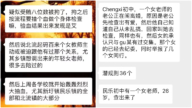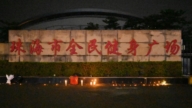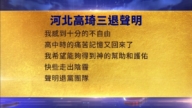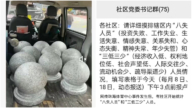【新唐人2014年05月16日訊】《美國有線電視新聞網》(CNN)報導了在中國被中共禁止的五種事物,這些禁令,是中共箝制中國境內媒體和資訊流通的途徑,同時也導致在中國的西方人非常不習慣。請看報導。
《CNN》在報導中指出,這5種被中共禁止的事物是推特、臉書、網站、西方電影還有書籍。
《CNN》說,在中國境內,有上千個網站無法訪問,這給西方人帶來了不便,也引發了國際社會對於中共審查制度的關注。
分析家認為,中共對於「社交媒體」在2011年的「阿拉伯之春」、和2009年6月的伊朗「綠色革命」,以及同年7月,在中國新疆西部烏魯木齊市爆發的流血暴動衝突中起的作用,感到非常不安。
旅美中國社會問題研究人士張健:「即便是沒有茉莉花革命、即便是沒有海外的這個大規模的群眾自發遊行事件、利用互聯網的事件,沒有這個前車之鑑,中共也不會開通。因為中共是比那些國家更要集權的。」
旅美中國社會問題研究人士張健表示,中共是靠宣傳起家,非常了解宣傳在人民心中的力量,為了維穩的需求、和政權的考慮,一定不會放開「推特」和「臉書」。
而另一位在大陸居住多年、曾擔任台灣一家集團企業執行長的許先生表示,在中國大陸所有工作的台灣人士,好像陷入一個孤島,幾乎跟台灣的聯繫完全斷掉。
大陸臺資企業前執行長許先生:「很痛苦的就是,每次到大陸去出差的時候,或者是在那邊長期工作中,往往要看一些跟工作上有關的一些信息、想要回到台灣的這些資訊的網站去看,包括台灣一些經濟方面統計的一些數字或一些官方的報告、經常跟生活比較有關台灣的一些新聞網站,都完全沒辦法上(網)。」
不過,有人認為中共禁止中國人使用「臉書」,是為了保護中國國內的社交媒體,和保護中國國內的科技產業。
許先生:「中國本身在發展這些社群技術,基本上大慨也都是翻版國外的、去侵犯到別人的智慧財產權,包括整個社群運營的模式、或者是社群的管理。」
張健:「互聯網企業它所應用的技術都是國外的技術,如果是真正保護一個企業,中共所要做的事情就是應該開放互聯網、開放自己的黨禁、言禁、報禁。」
《CNN》指出,在中共的嚴格審查下,網民被阻止訪問任何網站,社交網站的聊天室也被監控。特別是那些批評共產黨或談論人權之類敏感問題的網站,都屬被禁之列。
《自由亞洲電臺》13號報導,「六四」前夕,官方加強清網行動,中國網民近期在社交媒體中頻繁發表當年「六四」相關照片,輕則遭刪,重則封號,敏感程度空前。
微博網民幹小姐表示,最近封號現象比較嚴重。有很多網友都「轉世」重新申請帳號幾十次了,被封號都跟「六四」有關。她預測,「刪帖封號」到6月4號當天會達到頂峰,微博被關掉都有可能。
此外,新浪微博也施行新的舉報機制,在舉報欄中將優先處理所謂「政治敏感信息」。
許先生:「即便你是翻牆,有時候一些特定的敏感的時間,或一個特定敏感的事情發生之後,它的網管幾乎不管你是一個甚麼的信息的網站,它是全封的。」
許先生表示,如果中共繼續控制中國人的思想,相信,在中國社會造成的不安,一定會越來越嚴重。
今年2月,美國國務卿克里短暫訪華,那期間,他與中國知名網民—-《博聯社》創始人馬曉霖、資深時事評論員王沖、資深調查記者王克勤,以及網絡財經記者張賈龍等人會面,他們討論了中國互聯網自由等問題。當時中國網民要求美國,幫助中國渴望自由的人拆除網絡防火牆,提高中國的網絡自由。
採訪編輯/易如 後製/陳建銘
CNN has reported that various western
influences have been banned in China
by the Chinese Communist Party (CCP).
This is as the party seeks to further suppress
Chinese media and flow of free information.
These prohibitions make Westerners uncomfortable in China.
CNN reported that Twitter, Facebook, foreign films, Casinos,
websites, books and Snapchat are all banned in China.
CNN stated that thousands of
websites are also blocked in China.
This has caused restrictions to those
inside China, including westerners.
It has led to the international community
increasingly focusing on CCP censorship.
Analysts believe that the CCP is very disturbed by the
impact of social media during the 2011 Arab Spring.
The party has also witnessed the Iranian
Green Revolution in June 2009, and bloody
riots in Urumqi in Western Xinjiang in July 2011.
Zhang Jian, U.S. based China Social Issues
Analyst: “The CCP will not open up the Internet.
Even if there had not been a Jasmine Revolution
or large-scale mass incidents or spontaneous
demonstrations overseas through the Internet.
This is because the CCP is more
totalitarian than those countries."
Zhang Jian expressed that the CCP
is maintained through propaganda.
It knows the power of propaganda
on people’s hearts and minds.
In order to safeguard it’s stability and regime,
it will undoubtedly not open Twitter or Facebook.
Mr. Xu is former resident of China, and
former CEO in Taiwanese business.
He suggests that Taiwanese businessmen in
China feel like they are living on an lonely island.
They are out of contact with Taiwan.
Mr. Xu: “When I traveled to China or worked there for
a while, I often needed some work-related information.
I needed to visit Taiwanese websites for economic
information, statistical data, official reports or regular news.
There was no way to access these
sites, and it was a very painful experience."
However, others think the ban on Facebook is to protect
China’s social media and other technological businesses.
Mr. Xu: “China’s social media technologies
are basically copies of foreign technology.
This includes the operation model
of community management."
Zhang Jian: “Internet technology was invented overseas.
To truly protect businesses, the CCP should open
up the Internet and lift bans on political parties,
freedom of speech and freedom of publication."
CNN reports that under the CCP’s strict
censorship, Internet users are prohibited
from visiting sites that criticize the CCP.
Users are also not allowed to access sites that
discuss sensitive issues such as human rights.
Search results and social media
conversations are also censored.
Radio Free Asia reported on May 13 that
officials strengthened their operations.
This is to sweep the Internet
prior to June 4 commemorations.
Chinese netizens are currently frequently
publishing photos of June 4. on social media.
These posts are removed and their
accounts are closed in certain cases.
This degree of sensitivity is extreme.
Netizen ‘Ms. Gan’ expressed that it has gotten quite serious.
Many netizens have “reincarnated" by
re-applying for new accounts dozens of times.
These are all related to June 4.
She predicted that deletion and account
closing would reach its peak day on June 4.
Even microblogs might be turned off.
In addition, microblogging at sina.com
also implemented a reporting system.
It handles politically sensitive posts as a priority.
Mr. Xu: “During some sensitive times, or on a
sensitive topic, the Internet police block all sites.
Even if you cross over the firewall, it is no use."
Mr. Xu said that Chinese society will become more unstable
if the CCP continues to try to control people’s thoughts.
In February 2014 U.S. Secretary
of State John Kerry briefly visited China.
He met renowned Chinese netizens, including
“Bolian Association" founder Ma Xiaolin.
He met senior political commentator Wang Chong,
senior investigative reporter Wang Keqin, as well
as internet financial reporter Zhang Jialong.
They discussed issues such as Internet freedom in China.
Netizens in China asked the U.S. to help
Chinese people who thirst for freedom.
They need help to dismantle the firewall,
and improve China’s Internet freedom.
Interview & Edit/Yi Ru Post-Production/Chen Jianming





























